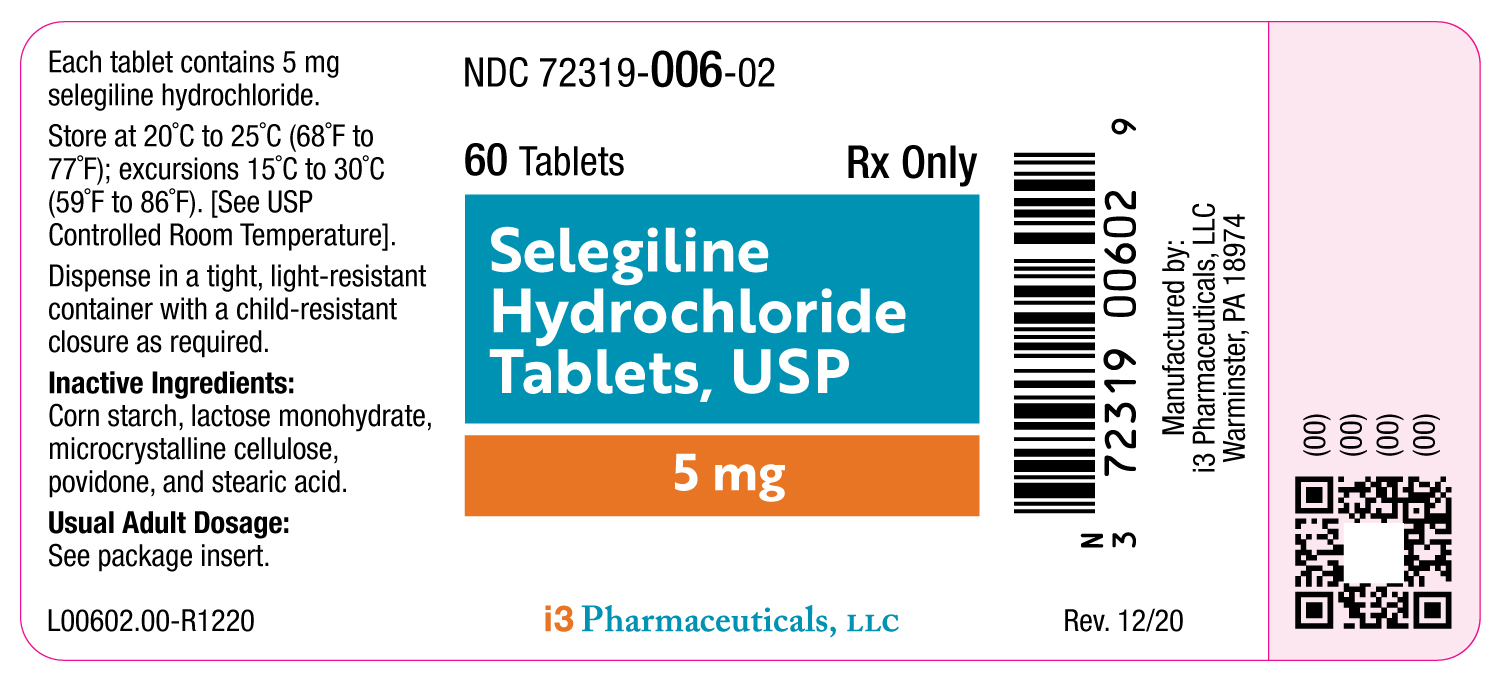In this article, we will be talking about the medication selegiline. Known also as deprenyl, this medication plays a key role in managing Parkinson’s disease and major depressive disorder. By acting as a monoamine oxidase inhibitor (MAOI), selegiline increases neurotransmitter levels in the brain, bringing about significant improvement in these conditions.
While it’s vital to acknowledge the benefits of selegiline, understanding how to correctly administer it carries equal weight. Awareness of potential side effects and necessary precautions ensures safety during its usage.
What is Selegiline?

Selegiline, also known as deprenyl, is a crucial medication for people with Parkinson’s disease and major depressive disorder. It works by affecting the complex chemistry of thebrain.
Here’s what you need to know about selegiline:
- Definition and Overview: Selegiline is a type of medication that blocks certain enzymes in the brain, slowing down the breakdown of natural substances called neurotransmitters.
- Role in Parkinson’s Disease: For individuals with Parkinson’s, selegiline helps relieve symptoms by preserving dopamine, which leads to better control of movement and a decrease in tremors.
- Role in Major Depressive Disorder: When treating major depressive disorder, it helps regulate the brain’s chemical messengers, resulting in a more stable mood and improved emotional well-being.
By adjusting important neurotransmitter levels, selegiline offers hope for a better life for patients dealing with these difficult conditions.
How Does Selegiline Work?
Selegiline is a medication that is commonly used to treat Parkinson’s disease and major depressive disorder. It belongs to a class of drugs known as monoamine oxidase inhibitors (MAOIs).
The Role of Enzymes
To understand how selegiline works, it’s important to first understand the role of enzymes in our body. One such enzyme is monoamine oxidase (MAO), which is responsible for breaking down certain chemicals in the brain, including dopamine.
Inhibition of MAO-B
Selegiline specifically targets and inhibits the activity of a subtype of MAO known as MAO-B. By doing so, it prevents the breakdown of dopamine in the brain.
Increased Dopamine Levels
With less dopamine being broken down, there is an increase in the levels of this neurotransmitter in the brain. Dopamine is involved in regulating mood and movement, so higher levels can lead to improvements in these areas.
Benefits for Parkinson’s Disease and Depression
The increased levels of dopamine resulting from selegiline’s action can help improve nerve communication and provide better control over symptoms associated with Parkinson’s disease and depression.
It’s important to note that while this elevation in dopamine levels can be beneficial for managing symptoms, it also has potential effects on overall brain function. This delicate balance highlights the need for careful monitoring by healthcare professionals when using selegiline.
Now that we have a better understanding of how selegiline works, let’s explore its proper use and administration.
Proper Use and Administration of Selegiline
When considering treatment with selegiline, it’s crucial to understand the correct use and administration methods to ensure efficacy and minimize risks.
Forms of Selegiline
- Oral Tablets: Typically prescribed for Parkinson’s disease, they should be taken as directed by a healthcare provider, often twice a day.
- Orally Disintegrating Tablets: Dissolve on the tongue without the need for water, offering an alternative for those who have difficulty swallowing pills.
- Transdermal Patch: Applied to the skin once daily, providing a steady release of medication for major depressive disorder treatment.
Transdermal Patch Formulation
- Applied to clean, dry, hairless areas of the body.
- Avoids first-pass metabolism in the liver, potentially reducing side effects.
- Offers convenience and improved adherence for patients with major depressive disorder.
Oral Route Administration
- Essential for Parkinson’s disease patients to enhance levodopa therapy.
- Taken at specific times to maintain stable drug levels in the body.
- Food interactions are less of a concern compared to non-selective MAOIs.
The choice between transdermal route administration and oral tablets depends on the condition being treated and individual patient preferences or needs. Regular consultations with healthcare professionals can guide adjustments in dosing or administration methods to optimize treatment outcomes.
What to Do If You Miss a Dose of Selegiline?
Navigating a missed dose of selegiline situation can be challenging. However, following these guidelines can help manage this scenario effectively:
- If you realize soon after the scheduled time, take the missed dose.
- In case several hours have passed, skip the missed dose entirely. Do not double up on the next dose to make up for what you missed.
- Regularity in taking medication is vital. Try setting reminders or alarms to help remember your doses.
As always, please remember that your healthcare provider’s advice should always be considered paramount. So when in doubt, seek professional guidance.
Precautions and Considerations for Taking Selegiline
When considering selegiline as a treatment option, it’s vital to take into account certain precautions:
- Hepatic impairment and renal impairment can influence how the body metabolizes this drug, potentially leading to adverse effects. Patients with these conditions should consult their healthcare provider before starting treatment.
- Selegiline might pose risks during pregnancy. It should be used only if the potential benefits justify the possible risk to the unborn child. Always discuss this with your healthcare professional.
- Finally, selegiline’s safety and effectiveness in pediatric patients have not been established. Hence, it is usually not recommended for use in children.
This highlights the importance of individualized treatment plans based on a comprehensive assessment of the patient’s medical history and current health status.
Common Side Effects of Selegiline
Like any other medication, selegiline can cause some adverse effects. It’s important to remember that not everyone experiences these side effects, and they often go away as your body gets used to the medication.
Common side effects of selegiline include:
- Nausea
- Abdominal pain or upset stomach
- Dizziness or lightheadedness
- Insomnia
- Dry mouth
These side effects are usually mild and temporary. However, if they persist or become bothersome, it’s advisable to consult a healthcare professional.
Keep in mind, everyone’s body reacts differently to medications. What might be a common side effect for one person could be a rare occurrence for another. This list is not exhaustive and other side effects may occur. It’s crucial to always communicate with your healthcare provider about any unusual or persistent symptoms while taking selegiline.
Identifying Rare but Serious Side Effects and Seeking Medical Advice
While selegiline is beneficial for many, it’s crucial to recognize the signs of rare yet serious side effects that warrant immediate medical attention. Vigilance is key when monitoring for:
- Sudden and severe headaches
- Vision changes
- Difficulty with speech or balance
- Convulsions or seizures
These symptoms could indicate a hypertensive crisis, a potentially life-threatening condition. Additionally, watch for signs of serotonin syndrome, characterized by agitation, hallucinations, fever, sweating, shivering, muscle stiffness or twitching, loss of coordination, nausea, vomiting, or diarrhea.
💡 Take Note: Drug interactions pose another significant risk. Combining selegiline with certain antidepressants or opioids can lead to critical reactions. Always inform healthcare providers about all medications being taken to avoid adverse effects from unintended drug interactions.
Avoiding Food and Medication Interactions with Selegiline
When taking selegiline, a potent MAO inhibitor, certain dietary and medication guidelines must be adhered to:
Food Interactions
- Tyramine-rich foods: Aged cheeses, fermented meats like salami or pepperoni, pickled herring, and yeast extracts should be avoided.
- Alcohol: Especially tap beers and red wines may contain high levels of tyramine.
- Overripe fruits: Bananas and avocados, particularly if they are overripe, can pose a risk.
Medication Interactions
- Prescription medications: Inform your doctor about all other medications you’re using, as certain antidepressants and narcotics can cause serious interactions.
- Over-the-counter drugs: Cold or allergy medications that contain decongestants should be avoided.
- Herbal supplements: St. John’s Wort or ginseng can lead to increased side effects.
For safety, always consult with a healthcare professional before making any dietary changes or starting new medications while on selegiline therapy.
Proper Storage and Disposal Methods for Selegiline
Storage Guidelines for Selegiline
To ensure that selegiline remains effective and safe, it is important to store it correctly:
- Keep the medication at room temperature, away from heat, moisture, and direct light.
- Always store the medication in its original container and make sure it is tightly closed when not in use.
- Store selegiline in a location that is out of reach of children to prevent accidental ingestion.
Disposal Guidelines for Selegiline
When it comes to getting rid of unused or expired selegiline, it is crucial to follow proper disposal methods that prioritize both human safety and environmental protection:
- Do not flush the medication down the toilet or pour it into a drain unless specifically instructed to do so by a healthcare professional.
- Utilize community drug take-back programs as they provide a safe and convenient way to dispose of medications properly. These programs are often offered by local pharmacies, hospitals, or law enforcement agencies.
If there are no drug take-back programs available in your area, you can dispose of selegiline in the household trash following these steps:
- Mix the medication with an unappealing substance such as coffee grounds or kitty litter. This helps make the medication less recognizable and appealing to others.
- Put the mixture in a sealed container, such as a plastic bag or empty container with a tight lid.
- Throw away the sealed container in your regular household trash.
By following these guidelines, you are playing an active role in promoting medication safety and protecting the environment.
Conclusion
Selegiline, also known as deprenyl, is an important medication for treating Parkinson’s disease and major depressive disorder. However, it is crucial for patients to follow the prescribed guidelines for its use and dosage in order to fully benefit from its therapeutic effects.
Regular communication with healthcare professionals is essential for monitoring any potential side effects and ensuring that the treatment is working optimally. By using selegiline safely and effectively under medical supervision, individuals with these conditions can experience a better quality of life.
Overall, selegiline has the potential to significantly improve the lives of those affected by Parkinson’s disease and major depressive disorder. It is a valuable medication that should be used responsibly and in accordance with medical advice.
Read More: Azathioprine: What is it and What you need to Know


